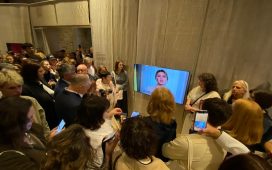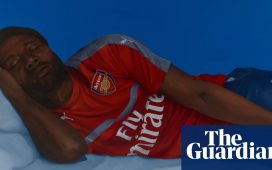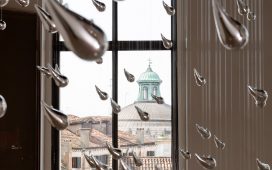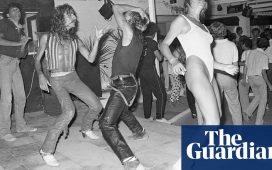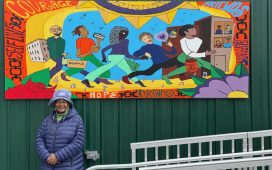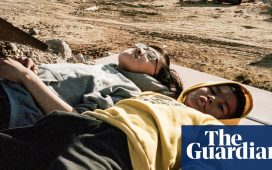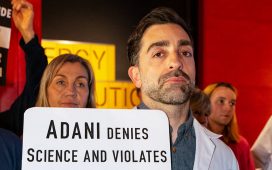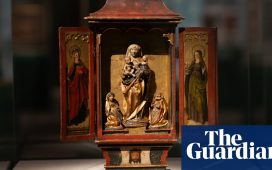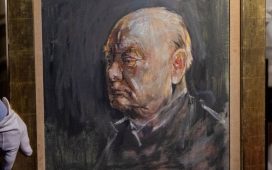The first couple of episodes of the current series of Grand Designs have already aired, but – as if it was itself an over-running building project – Kevin McCloud is still filming. When we speak over Zoom, from the small studio he set up “in a cupboard”, he has only just got home from filming; and as soon as we finish, he will be recording a line or two of his famously lyrical thoughts for an episode that goes out this week. It sounds stressful and I feel every bit as on edge as I do watching one of his couples race to finish a house before the weather closes in, or the woman gives birth, or the money runs out, but McCloud looks relaxed. He has, after all, been doing this for more than 20 years.
The current series of Grand Designs is the 22nd. McCloud says he is always coming up with new reasons for its popularity. “The oldest explanation is I think it’s the last great big adventure that we can all go on and, therefore, we all connect to the idea of that,” he says, of the huge task that is building a house. “Also, we connect to the idea of home, because the notion of home is not simply a concept, it’s a place of psychological dependency.” Watching someone else create a home “strikes at something very primal within us”, he reasons. The characters are fascinating, of course – how do they have so much money? Why does this man (it’s almost always a man) think it’s a good idea to turn a nuclear power station or a sewage plant into a family home? And there is something deeply satisfying in the end result – an imposition of order on a quagmire of a building site, overcoming supply issues and dwindling funds. Finally, despite McCloud’s scepticism early on in the episode and the occasional barbed comment, his climactic monologue will be celebratory. At the very least, he will find something to praise. It is not a cynical show.
Is it hard to be nice about buildings that end up being awful? “Yes,” he says immediately, deadpan, then laughs. “You fall back on the narrative, on the story of the people.” There is always something positive to say, he adds, “even in the worst possible case, and I’m very mindful that we all come to judge very quickly. Social media is fraught with negativity and judgmental attitudes.” He advises contributors not to look at social media when their episode airs “because you will be hurt, and it will last, that pain”.

I wonder if McCloud lies awake at night, worrying about his self-builders’ disputes with their neighbours or whether that giant bit of glass manufactured in an obscure German town will make it in time, but he says he is too busy, adding that he follows up to 30 building projects at a time – as well as Grand Designs, there are its spin-off shows such as House of the Year and The Street, which follows 10 households building their own homes. “I cannot and should not become emotionally involved.” What about the man with the lighthouse? (Edward Short demolished his family home on a Devon clifftop, then spent 10 years creating an art deco-style lighthouse which wrecked his marriage and put him £4m in debt; apparently it is nearly finished and should go on sale this year). It must be hard not to feel for him? “Of course. We do email. I mean, I’ve got a heart,” says McCloud.
Is he ever shocked by the final cost of things? “Yeah,” he says, then adds, “I am shocked by the cost of everything: petrol … the weekly shop.” He seemed visibly appalled – as were the hordes on Twitter – by the £125,000 one couple spent on a kitchen in the first episode of the new series. “My shock is just sort of an expression of moral indignation, really,” he says, smiling when I mention it. “I was brought up as a Methodist and I would never spend that money on a kitchen. I just couldn’t do it, I can’t see the value. I can see the value of insulating the building, and of giving yourselves zero-carbon technologies, and reducing your bills and environmental impact. I can see the ethical value of that. But what I can’t see is the ethical …” He pauses. “I can’t see the justification for gross spending on what are essentially basic requirements.”
Surely, it is especially wrong, when we’re in the midst of a housing crisis, to spend so much? McCloud softens a bit. The house was – in terms of scale, ambition and cost – on another level. The handmade kitchen “was a piece of craftsmanship, and it was beautifully assembled. I’m all for spending money on high levels of craftsmanship and individuals who are really talented, but …” He pauses and smiles. “It’s a hard thing, isn’t it?”
McCloud is always asked whether he would ever do his own grand design. “To which I say: how do you know I haven’t? I have built, and restored and repaired and I’ve extended and remodelled. I’ve done it all off camera, very carefully in order to keep my life private, but also to preserve the myth.” He smiles, then adds he is only half-joking. “It’s important that I should remain a cipher. I should be the conduit for ideas, I shouldn’t be colouring things too much.” Which might happen if we all knew he lived in a wattle-and-daub cottage, or a modernist masterpiece. I can see what look like ancient beams behind him. “It’s an unfinished house,” he concedes. “It was unfinished in 1650.”
McCloud grew up in an unfinished 60s house, which his dad finished, then extended. His father was an electronics engineer “so he was always mucking about with stuff,” says McCloud. He would replace the boiler, then give his three sons the old one to take apart and reassemble. All three have become involved in buildings in some way or another, and one of McCloud’s four children is now an architect. McCloud may have spent his childhood and youth in a Bedfordshire village, but it had a range of architecture that interested him – 1930s semis, a row of 40s bungalows, a 50s estate. His first school was Victorian while a later school was a modern 60s building. “All these kind of archetypes were just there, you could reach out the window almost and touch them,” he says.

His parents met in the chapel choir, and music was an important feature of home. After A-levels, he went off to Italy to spend a formative year working on an organic farm in Tuscany, while also studying singing at the Florence Conservatory of Music. When they offered him a three-year place, he wrote to his father to tell him he wouldn’t be returning to start his degree at Cambridge University. “And he wrote me the only letter he ever wrote to me, which was pretty stiff – rightly so, because he’d come from a very challenging background, and so for him to actually go to university was a big thing.” A place at Cambridge therefore seemed the pinnacle. So he returned.
He had been to a grammar school that turned comprehensive. Did he feel out of place at Cambridge? “I felt immensely urbane because I’d been in Italy for a year and a half,” he says. “I was surrounded by boys who’d come straight from boarding schools. I’d gone off and done all this stuff. But of course, that was a mask [to] cover my insecurity about the fact that I didn’t know how anything worked. You know, the idea of going to hall for dinner. This was an antiquated, medieval institution, venerated, venerable, and I still support it. It was hugely formative for me, but I didn’t fit in.” Although, he adds, “to go to lectures by [the art historian] Ernst Gombrich or [the moral philosopher] Bernard Williams, this was mind-bendingly good”.
McCloud, who studied history of art and architecture, was drawn to design – he did the sets and scenery for Footlights, and then worked as a theatre designer for several years. He was running a lighting design company when he was approached to be on TV in the mid-90s – it was the era of the home improvement show – and from this, Grand Designs was born in 1999 (the TV producer, now writer, Daisy Goodwin spotted McCloud’s potential for something more epic than mere makeovers).
He is a great talker: engaging, self-deprecating and passionate about the things that interest or anger him. He finds it “iniquitous and hugely corrosive” that land values in the UK are so high because companies hoard land and drip-feed it into the market. “What’s really needed is a complete radical state-controlled distribution of land and a removal of land profit from the equation. That sounds nuts and Stalinistic, but it’s exactly what happens in Germany,” he says. “Since the war, our planning system unwittingly has worked in cahoots with capitalism to create an unsustainable development economy.” We’re “pretty much”, he says, the only country in the world to have so few major construction companies dominating the market. And they build the most cramped houses in Europe. “If you’re a housebuilder, the only way you can make some money and sell a house people can afford is to build really small ones. It’s awful.”
McCloud has long talked about social and environmental sustainability – the kind of housing that works for communities, and also has a low carbon footprint – and says those working in the social housing sphere are doing interesting work , but the big developers aren’t. “They build stuff that looks good in the brochure. We’ve had a series of governments who have been hellbent on diluting policies and giving the market more freedom and not clamping down on performance standards. All that does is encourage a libertarian attitude in the market to do stuff which is competitive and looks the business and sells. But no, I don’t think we’re anywhere near achieving [net zero emissions].”

Alongside his TV career, McCloud built up a property business, HAB Housing, with a mission to design and build sustainable housing that was more inspiring than the identikit estates made by the major construction companies. There have been successes and failures. In 2019, two of the sister companies he had been a director of went into liquidation and the investors, from whom £2.3m had been raised through an unregulated minibond scheme, are facing a loss. According to Jackie Porter, a county councillor in Hampshire, one of HAB Housing’s developments – Lovedon Fields near Winchester – was meant to have been completed in 2018 but only got its road resurfaced recently. Porter, who has been familiar with the scheme from the start, adds that residents have had to fund their own repairs to their new houses and promised amenities, such as allotments, are still to materialise. McCloud hasn’t been a director of the company since early 2018, and his publicist says that he has not had any control or connection with the delivery and performance of the site since that time.
I am told before we speak that McCloud will not talk about any of this because of ongoing proceedings. Will he say how it has affected him, personally? He looks pained, but gamely tries to answer. “Well, in two ways. I’m enormously proud of the work that we did,” he says. The developments are interesting and different; Lovedon Fields has a wildflower meadow, and is protected in perpetuity in partnership with the charity Fields in Trust. It may still be lacking streetlights, but still. (Porter says the development is “really innovative”.) “I’m immensely proud on the one hand, and on the other, I’m very poor,” he says, mildly sardonic. “I invested a vast amount of my money and earnings into that business. So for me, it was a personal thing, and we employed great people, and did some wonderful schemes and got some great things going. And it’s a shame that not everything in life can be as successful as you want it to be. I’m not one ever to say ‘if only’…” He pauses. “Events like that, like successes, we’re all governed by the influences of, it seems, the stars.” In a 2019 statement, he blamed, among other things, rocketing construction costs and skills shortages. To me, he says: “It’s very, very difficult to build in the UK, and very hard to achieve schemes where you actually do more than build houses, where you build community.”
He’s deeply grateful for Grand Designs “because that’s been an enormous success, and it’s led me to places, to meet people and do things which I would not have dreamed of doing. So I must not be negative about the failures, because in a way they build you as much [as the successes].”
He says he has always defined himself through his work. Did he worry the whole thing had damaged his credibility? “I don’t worry about it. I think it’s …” He pauses. “I did worry about it, but I’m of the view that it hasn’t changed what I do, which is to provide ideas and to try to be inspirational and to communicate.” Being on TV, says McCloud, is where you project “a larger version of yourself, and the private personal self is underneath; they should be representations and reflections of the same individual [but] beneath it all, all of us are the same. We all feel vulnerable at times.”
How long does he think he will be doing Grand Designs for? That, he says wryly, “is dependent entirely on health and joints. Directors get me to bend down a lot and climb ladders, and wander all over building sites.” McCloud, who is 62, says he looks after himself a bit better now. “I used to just keep going. As you get older, you can’t do that, but it doesn’t stop me from trying.” This is the point where, if he were on screen in stylish outdoor gear while uplifting music soars in the background, McCloud might say something poetic about passion and hard work, but also mistakes and misfortunes along the way.
The new series of Grand Designs airs on Wednesdays at 9pm on Channel 4.
